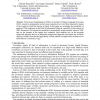Free Online Productivity Tools
i2Speak
i2Symbol
i2OCR
iTex2Img
iWeb2Print
iWeb2Shot
i2Type
iPdf2Split
iPdf2Merge
i2Bopomofo
i2Arabic
i2Style
i2Image
i2PDF
iLatex2Rtf
Sci2ools
116
Voted
ISICT
2003
2003
Tag semantics for the retrieval of XML documents
Word Sense Disambiguation (WSD), in the field of Natural Language Processing (NLP), consists in assigning the correct sense (semantics) to a word form (lexeme) by means of the context in which the lexeme is found. In this paper we investigate the possibility of applying WSD techniques to the field of Information Retrieval, especially to the retrieval of XML documents. We consider two methods to automatically assign semantic values to XML tags on the grounds of the tagged text contained. Such methods rely on the bayesian supervised approach and on an automatic unsupervised approach and exploit the WordNet ontology. Results show that the applicability of both methods is hampered by the habit of use abbreviations or shortcuts as tags.
Information Technology | ISICT 2003 | Natural Language Processing | Word Sense Disambiguation | WSD Techniques |
Related Content
| Added | 31 Oct 2010 |
| Updated | 31 Oct 2010 |
| Type | Conference |
| Year | 2003 |
| Where | ISICT |
| Authors | Davide Buscaldi, Giovanna Guerrini, Marco Mesiti, Paolo Rosso |
Comments (0)

